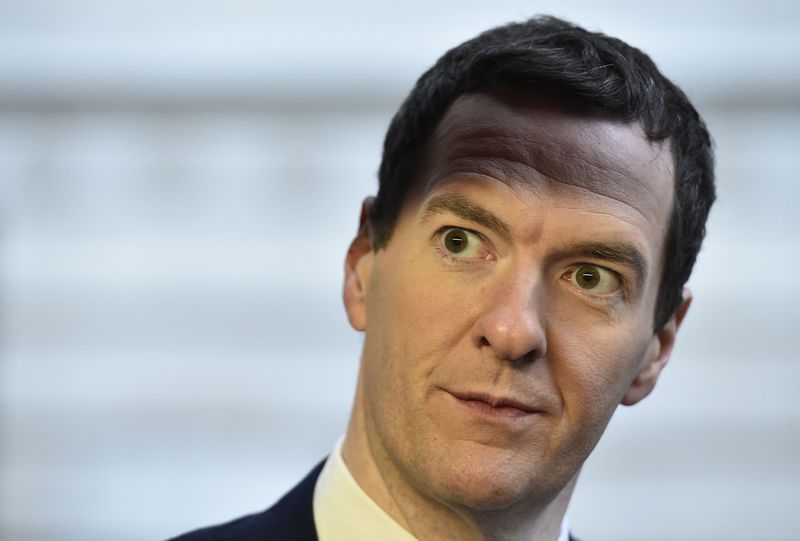By Andy Bruce
LONDON (Reuters) - British finance minister George Osborne's plans to cut state spending to its lowest since the 1930s are unrealistic, according to a firm majority of economists polled by Reuters.
With less than five months before the next general election, Osborne last week sought to impress voters with new plans to put Britain's budget back in the black before the end of the decade.
The Office for Budget Responsibility, Britain's independent watchdog, said his plans would likely push British state spending down to around its lowest level in around 80 years.
Seventeen out of 22 economists polled this week said this was "not achievable".
"The numbers should be treated purely as a forecasting exercise which have some built-in slippage," said Peter Dixon, economist at Commerzbank. "Nobody really expects the UK to produce such a surplus on a five-year horizon."
There was better news for Osborne in that a relatively firm majority of economists, 16 out of 26, said that Britain was now on a sustainable path to solid economic growth.
His ruling Conservative Party hopes that Britain's economic upturn -- among the strongest this year for any advanced economy -- will persuade voters to re-elect the party when they hit the polls on May 7.
But fiscal credibility is another pillar in the government's pitch to the electorate, and the feasibility of Osborne's latest spending plans has been roundly questioned.
On Tuesday, the independent Institute for Fiscal Studies said the government had made "remarkable choices" to cut income and corporation tax when public spending is facing a severe squeeze.
Peter Mandelson, a former cabinet minister whose opposition Labour party is seen in opinion polls as less trusted to handle the economy, told the Times on Tuesday that Osborne's plans handed Labour a "new opportunity" to exploit public concerns about cuts.
Britain's budget deficit is currently somewhat over 5 percent of economic output, down from just over 10 percent when Osborne took office in 2010, but well short of his promise then to get borrowing down to just over 1 percent of GDP by 2015.
SOLID GROWTH IN 2015
The monthly poll of economists also showed that the swift pace of Britain's economic recovery looks set to slow only slightly next year, with the consensus pointing to a steady rate of growth as a housing boom in Britain cools off.
Having grown 3 percent in 2014, Britain's economy looks set to expand 2.6 percent next year and 2.4 percent in 2016 -- slightly more optimistic than the OBR's latest forecasts.
Britain has relied on domestic demand to propel its economic recovery since the middle of last year, but a sharp slowdown in the euro zone in recent months has added to problems hampering the government's plan to focus the economy more on exports.
While most economists expressed confidence about Britain's economic prospects, there was a note of caution in some responses.
"OBR projections of steady growth in the medium term rely on household debt to income ratios rising back above pre-recession levels, which may well not be sustainable in the longer term," said John Hawksworth, economist at PwC.
The poll also showed the Bank of England will wait until the third quarter of next year before hiking interest rates from their record low 0.5 percent, their level since early 2009, unchanged from a poll conducted two weeks ago.

British interest rates will have to rise despite an expected dip in inflation but the exact timing of the hike is uncertain and any moves are likely to be gradual, Bank of England Governor Mark Carney said in an interview published on Wednesday.
(Polling by Siddharth Iyer in Bengaluru; Editing by Susan Fenton)